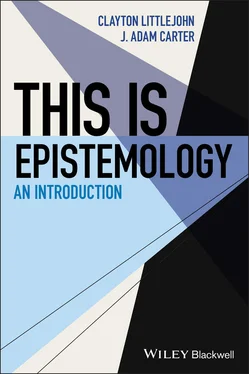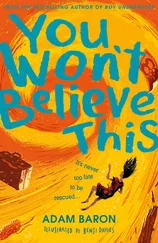2.56Philosophers have raised a number of objections to the disjunctivist view, but we want to flag one particular objection that's important in an epistemological setting. The disjunctivist thinks that the experience we have when we perceive a tomato, say, is a relation between the perceiver and a tomato in which the tomato is something that the subject is directly aware of. They will grant that this isn't so when the subject has a hallucination, but insist that we shouldn't think of the conscious episode we have in hallucination as an “ingredient,” or part of what transpires in cases of perception. Let's suppose for a moment that this is so and that the underlying nature of the episodes taking place in perception and hallucination are fundamentally different. How is this epistemically helpful? By hypothesis, the perception is indistinguishable from the hallucination.
2.57We might put the worry this way:
P1. Epistemic disjunctivism offers an interesting epistemic pay‐off only if it succeeds in establishing that the support provided by perception is better than the support provided by hallucination.
P2. Perception is indistinguishable from hallucination.
P3. If perception and hallucination are indistinguishable, then it's not the case that the support provided by perception is better than the support provided by hallucination.
C1. Therefore, it's not the case that the support provided by perception is better than the support provided by hallucination.
P4. Epistemic disjunctivism succeeds in establishing that the support provided by perception is better than the support provided by hallucination only if the support provided by perception is better than the support provided by hallucination.
C2. Therefore, it's not the case that epistemic disjunctivism offers an interesting epistemic pay‐off.
The disjunctivist needs either to show us where this argument goes wrong or tell us a story about why we should think that the rational support provided by perception and hallucination are both good enough. This is something that is being explored now in the current literature, 15 and it remains to be seen whether disjunctivism will catch on and how the disjunctivists will respond to this line of argument.
2.8 Does Experience Provide Us with Reasons to Believe?
2.58The discussion from the last chapter makes it clear that it is not uncontroversial that experience could be a justifier that justifies some of our non‐inferential beliefs. Coherentists have denied it, for example. Donald Davidson famously stated that the only thing that could be or give us a reason to believe something is another belief. As he saw things, sensory experiences might cause us to believe things, but they could never justify the beliefs that they cause. If those beliefs are justified, they would be justified because they were supported by further beliefs. Why did he think this? Davidson thought this because he thought that that nothing could justify a belief unless it stood in some logical relation to it. He further thought that experience didn't stand in the kinds of logical relations that our beliefs do. 16
2.59To understand Davidson's concerns, think about how you would typically go about offering a justification for a belief. You would offer something like an argument. A friend wants to know why you're convinced that it was Plum who killed Mustard; you might state a series of things that logically rule out alternative hypotheses (e.g. we know that it wasn't White, it wasn't Green, etc.). To play the role of supporting premises, the idea is that the supporting premise has to stand in some logical relationship to the conclusion (e.g. by ruling out the possibility that it is false). In the case of inferential reasoning, these premises are things that the thinker believes. These beliefs are, in turn, things that can be assessed for accuracy (i.e. they can be true or they can be false, correct or mistaken). In this respect, he thought that experiences differed from beliefs. Experiences, he thought, didn't stand in logical relations to beliefs in the way that other beliefs do. The belief that Plum alone killed Mustard logically entails that it wasn't someone else. A conscious experience does not logically entail anything.
2.60Putting this all together, we get an argument against the foundationalist view under consideration in this chapter. This argument is supposed to show that the beliefs that we form in response to perceptual experience are not non‐inferentially justified but would only be justified by support from further beliefs:
A Davidsonian Argument against Foundationalism
While an experience might cause a thinker to believe something, it does not give the thinker a reason to believe that thing. Nothing can give a thinker a reason to believe unless it stands in a logical relation to the thinker's beliefs. Only further beliefs do that. Experiences do not. An experience could only provide non‐inferential justification for our perceptual beliefs if they provided us with reasons for these beliefs. So, experience cannot provide non‐inferential justification for our perceptual beliefs.
Where does this leave us? Is foundationalism finished?
2.61Let us now flag two controversial premises in this argument. A foundationalist might push back against one or both of these assumptions:
Premise Principle : the only things that can confer justification upon a belief are things that give us reasons to believe that are like premises (i.e. things that could be premises in an argument for what we believe). 17
No Content View : whereas beliefs have propositional contents that can be assessed for accuracy and inaccuracy and stand in logical relations to belief, experiences do not have propositional contents.
If the foundationalist rejects the Premise Principle , they might grant that Davidson is right about what experiences are like but mistaken in thinking that this means that they cannot confer justification upon our beliefs. If the foundationalist rejects the No Content View , they might accept Davidson's assumptions about what kinds of things can justify while challenging Davidson's suggestion that experiences lack the properties needed to confer justification upon our beliefs.
2.62One can imagine a foundationalist taking issue with the Premise Principle . They might agree that in the case of inferential justification, we need the support of premises in the form of things that we believe for a belief to be justified. Perhaps one important difference between the case of non‐inferential justification and inferential justification is that in the former we don't need premises to justify our beliefs. When our experiences cause us to believe things, this gives us all the justification we need and it obviates the need for support from premises. We need supporting premises when we cannot determine something directly.
2.63Davidson is surely right that not any old cause can produce a belief and thereby justify it, but if he thought that something's being a cause meant that it couldn't justify, maybe that was a slip. Consider the knowledge we have of our own actions. If someone asked you what you're doing and you responded by saying, “I'm trying to read,” it's hard to think of a premise that could have been your reason for thinking that you were trying to do that and not, say, trying to make lunch or trying to run a mile. Whatever story we tell about how this knowledge is acquired, we might think that the Premise Principle is too limiting. There is some story that psychology will tell us someday, we might think, about how our judgments about our own actions connect up to our doings, and the difficulty of identifying any kind of evidence or premise that we could have relied on to determine what we're doing might rightly be taken to be trouble for the Premise Principle , not for the idea that we can know what we are doing or trying to do in a special direct way that others cannot.
Читать дальше












